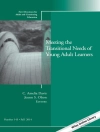This book analyses the range of potential measures national quality assurance agencies may have to employ to deal with the new issues caused by Cross Border Higher Education (CBHE). The expansion of CBHE raises quality problems, which are currently assessed differently depending on the countries concerned. This has been exacerbated by the growth of Massive Open Online Courses (MOOCs) which have developed very quickly and can be prone to rogue providers. This book considers the steps that have already been taken to ensure quality as well as those ahead. It is important that the swift growth of CBHE is not just seen as a means to increase the revenues of higher education institutions faced with decreasing public funding but also as a means to keep educational standards high.
Daftar Isi
Chapter 1. Introduction; Alberto Amaral.- PART I: ANALYSING THE PROBLEM.- Chapter 2. Crossing the Border: Some Views, Largely Historical and Occasionally Heretical, On the Sudden Enthusiasm for an Exceedingly Ancient Practice; Guy Neave.- Chapter 3. The Business of Cross-Border Higher Education; Jamil Salmi and Orlanda Tavares.- PART II: THE VIEW OF STAKEHOLDERS.- Chapter 4. The Shift to Strategic Internationalisation Approaches; Andrée Sursock.- Chapter 5. The View of the European Students’ Union on CBHE; Tiago Martins.- PART III: THE SERVICES DIRECTIVE.- Chapter 6. Cross-Border Higher Education and the Services Directive: Importance, Protection, Success; Luigi Berlinguer.- Chapter 7. The New Old Debate. Free Movement of Services and the Freedom of Establishment within the Internal European Market: Does the Directive 2006/123 EC Move Past Education? Concerning the Border of National Sovereignty within the EU; Jan de Groof.- Chapter 8. Cross-Border Higher Education: The Situation at European Level – Comparing National Implementation; Lukas Bischof.- PART IV: NATIONAL CASES OF CROSS-BORDER HIGHER EDUCATION.- Chapter 9. National Cases of Cross-Border Higher Education: Austria; Elsa Hackl.- Chapter 10. National Cases of Cross-Border Higher Education: The Experience of the UK; Stephen Jackson.- PART V: QUALITY PROBLEMS IN ALTERNATIVE CASES.- Chapter 11. GATS and the “OECD/UNESCO Guidelines for Quality Provision in Cross-Border Higher Education”: Its Relevance for Quality Assurance in the Past and the Future; Achim Hopbach.- Chapter 12. Massive Open Online Courses (MOOCs); Joaquim Ferreira.- PART VI: QUALITY AGENCIES AND CROSS-BORDER HIGHER EDUCATION.- Chapter 13. Quality Assurance of Cross-Border Higher Education – A Case for Collaboration between National Quality Agencies; Padraig Walsh.- Chapter 14. The Other Side of the Atlantic. Quality, E-learning and Alternative Providers of Higher Education; Judith Eaton.- PART VII: CONCLUSION.- Chapter 15. Conclusions; Maria João Rosa, Cláudia Sarrico and Orlanda Tavares.
Tentang Penulis
Maria João Rosa is Assistant Professor at the Department of Economics, Management and Industrial Engineering, University of Aveiro, Portugal. She is also a researcher at Centre for Research in Higher Education Policies (CIPES). Her main research topics are quality management and quality assessment in higher education institutions. She is member of CHER and of EAIR’s executive committee.
Cláudia S. Sarrico is Associate Professor at ISEG Lisbon School of Economics and Management, Universidade de Lisboa, Portugal. She is also a researcher at Centre for Research in Higher Education Policies (CIPES). Her main research interests are performance measurement and management in higher education. She is a member of CHER Consortium of Higher Education Researchers and of EAIR The European Higher Education Society’s executive committee.
Orlanda Tavares is a researcher both at the Agency for Assessment and Accreditation of Higher Education (A3ES), Portugal, and at The Centre for Research in Higher Education Policies (CIPES), Portugal. She completed her Ph D in Educational Research at University of Porto, Portugal. Her main interest areas are policies in higher education and quality assurance/enhancement, students’ perceptions on higher education.
Alberto Amaral is Professor at the University of Porto, Portugal and a researcher at Centre for Research in Higher Education Policies (CIPES), Portugal. He was the rector of Porto University from 1985 to 1998 and former chair of CHER. He is life-member of IAUP and member of the Board of IMHE/OECD. At present he is the chair of the administration council of the Portuguese Assessment and Accreditation Agency for Higher Education.












